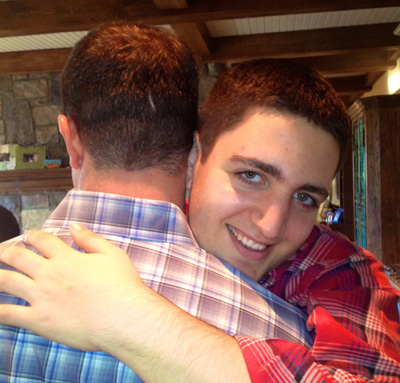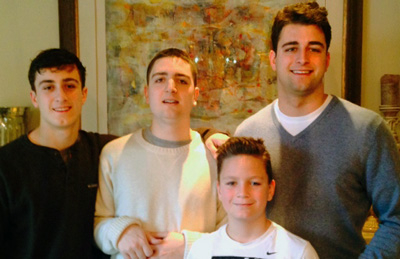Caring for Those with Autism as They Grow Older
Rutgers alumni looking for an answer for their son launch an adult day program they hope to expand throughout the state

'I love the autism population. They need people speaking for them because in many cases they can’t speak for themselves.'– Danielle Lumby
Six years ago, Danielle and Jeff Lumby’s lives seemed complicated enough.
The Rutgers alumni were raising four boys, including their then 15-year-old autistic son, Sean.
Diagnosed with the developmental disorder at 19 months, the Lumbys learned routines and behavioral tactics to cope with Sean’s limited communication skills, bouts of aggression and tendency to wander from home. But adolescence presented new challenges.
“There was a lot of explosive behavior,” said Danielle. “We were bringing people into the house to help, but it was even hard with the addition of an aide.”
Getting through each day – and getting an increasingly obstinate Sean on the bus to Ridge High School each morning – felt like an ordeal. That’s when they received news that knocked the wind out of them.
“The transition coordinator with Ridge High School special services told me, ‘Oh, by the way, we have nowhere to send him when he’s 21,’ ” said Danielle. “I didn’t want to think about what I was going to do with him when he’s 21. I just wanted to think about how I was going to get him to go school tomorrow morning.”
Danielle now knows too well a truth many parents like her don’t realize until it’s too late. Once developmentally disabled children age out of the public education system, the state is not legally required to provide adult day programs. In fact, in New Jersey, where one in 48 children are diagnosed with autism – the highest rates nationwide – there are very few programs able to accept severely autistic adults, like Sean, who require a significant amount of supervision.
“It’s like falling off a cliff when you hit 21,” she said, “because there are literally no services for you.”
Danielle had a choice: she could be daunted by the discouraging news or she could do something about it.
“I woke up in the morning and said, ‘If you don’t do it, no one else will.’ ”
Next year, when Sean is scheduled to “fall off the cliff,” there is a good chance he will land in an adult day program based in a Basking Ridge synagogue minutes from his home – thanks to his mother.
The day program, Hope Autism Solutions, designed specifically for adults with autism, is funded by Hope Autism Foundation, which was founded in 2010 by the Lumbys and several other parents in the district. Their goal was to research existing programs and raise funds so they could create new opportunities for their children.
Their research led them to Our House Inc., a Murray Hill-based nonprofit that provides residential, employment and recreational services to individuals with developmental disabilities. Our House Inc.’s former CEO, Michele Wernsing, a graduate school alumna of Rutgers’ School of Social Work, had been studying adult autism programs for a decade when she met Danielle.
“I had the parental expertise, and she had the professional expertise,” Danielle Lumby said.

By the end of 2011, Hope Autism Foundation (HAF) developed a partnership with Our House Inc. and hosted its first gala fundraiser which raised $150,000 for start-up costs: construction, furnishings and technology. In October 2012, the first Hope Autism Solutions (HAS) site opened in Basking Ridge for nine clients. The following summer, that site reached its 21-client capacity and had full waiting list. The second HAS site opened in New Providence in 2014. A third opened last month (Oct.) in Basking Ridge and a fourth is being planned for Montclair in 2016. The HAS program is funded largely by the state, but without additional funding from the Hope Autism Foundation it would not be able to afford such add-ons as soccer, yoga and nutritionist-led cooking classes.
Danielle’s goal is to open a site in each of New Jersey’s 21 counties. But the Lumbys are not just interested in quantity. To ensure the quality of their programs, they forged a partnership this year with Rutgers’ Graduate School of Applied and Professional Psychology (GSAPP) to assess their sites. A grant provided by HAF now sponsors second-year graduate student Nicole Eskenasi with GSAPP’s Natural Setting Therapeutic Management program to work with the day programs as a consultant.
Andrea Quinn, assistant project director of the NSTM program and a 2006 graduate of the GSAPP clinical program, said the pairing is an excellent opportunity for both the HAS staff and graduate students like Eskenasi.
“She is able to work in those day programs, offer them her perspective and ideas, and get to know the clients,” said Quinn, who is also conducting her own site observations and mentoring Eskenasi. “But she is also a graduate student, so it provides her with a clinical experience. She is learning from the staff of HAS how adults with autism spectrum disorders, even those with behavioral challenges, can have both meaningful work and community involvement.”
Quinn is impressed with what she has seen so far at the HAS sites, where participants are engaged in a variety of structured activities, such as yoga, art, soccer and prevocational work, and supervised by an energetic and attentive staff.
Danielle plans to continue investing her time and money in Hope Autism Foundation to ensure it thrives even after her son’s future is secure.
“I love the autism population,” she says. “They need people speaking for them because in many cases they can’t speak for themselves.”